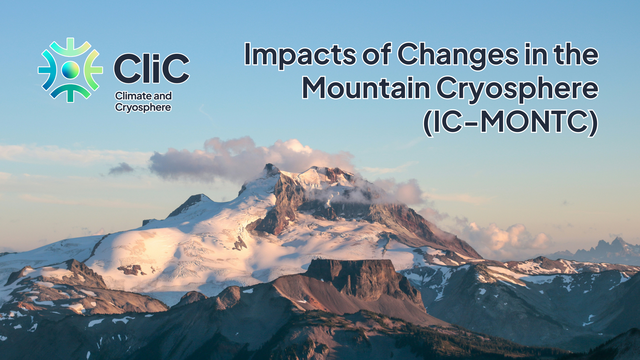
Climate and Cryosphere aims to understand and assess the wide range of societal impacts of the loss of the mountain cryosphere through a newly proposed strategic initiative: Impacts of Changes in the Mountain Cryosphere (IC-MontC).
As global warming continues to alter and disrupt our cryosphere, vulnerable populations and downstream environments in mountain regions across the globe face increasing hazards such as loss of ice and snow cover, permafrost thaw, and the development of Glacial Lakes Outburst Floods (GLOFS). These hazards lead to a range of cascading impacts and compounding risks, including water and food security, power generation, terrestrial and aquatic ecosystem integrity and downstream river navigation. With these hazards and risks in mind, plus the UN International Year of Glacier Preservation on the horizon in 2025, Climate and Cryosphere aims to understand and assess the wide range of societal impacts of the loss of the mountain cryosphere through a newly proposed strategic initiative: Impacts of Changes in the Mountain Cryosphere (IC-MontC).
To address knowledge gaps, CliC will build a partnership among a global network of existing mountain cryosphere activities to address observational and model-data deficiencies and thereby respond to the need for policy-relevant cryosphere science, with emphasis on: observationally-constrained, high-resolution atmospheric, cryospheric, and hydrologic numerical models and coupling between them, with sufficient resolution to resolve key physical processes and to capture elevational/topographic and other environmental gradients. The goal of IC-MONTC is to support the knowledge needs of multiple stakeholders and to engage and foster a dialogue from science to policy-relevant outcomes to improve the resilience of sensitive environmental and human systems. These needs were identified at a WCRP/CliC-sponsored scoping workshop in April 2024 which included representatives of key research groups.
As a result of this meeting, CliC proposed an initial workshop in partnership with the MRI and GEO Mountains observational networks to bring together modeling groups and data experts focussed on mountain regions worldwide to assess the status and current needs of high-resolution modeling in complex terrain environments. CliC envisions this initial workshop as a first step within a broad, multi-year strategy to address the full scope of connections between climate, mountain cryosphere, mountain hydrology, and community impacts. Expected key outcomes also include: i) identification of data and modeling gaps and a strategy for addressing them and a series of assessments, ii) broadening participation: capacity sharing achieved through including ECRs and wide regional participation through training and broadening opportunities for exchange and collaboration, and iii) community participation: constituting community informed modeling needs and uptake.
If you are interested in IC-MONTC and would like to get involved and/or be added to our mailing list to receive future updates, please contact the CliC IPO at

